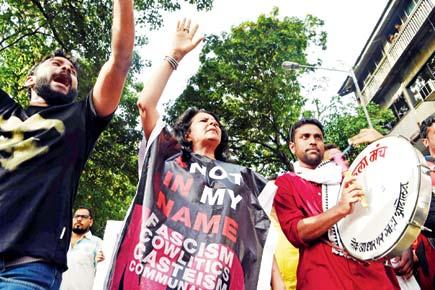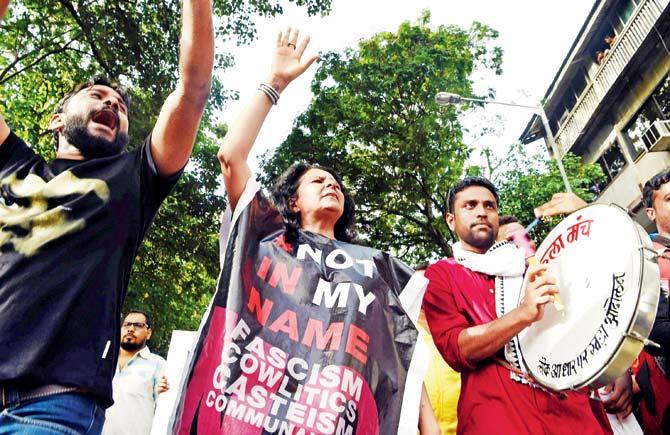It seems only a certain type of Indians are upset with mob violence. Or maybe it's culturally incorrect to feel pain for Muslims and Dalits


Demonstrators took part in a protest against a spate of murders targeting Muslims and Dalits under the pretext of cow vigilantism in Mumbai on Monday. Pic/AFP
Every now and then we have little discussions in India on culture and what it means and how it has changed us. Unlike France, which seems to have very strict rules about what being French means, culture remains changing and amorphous for the rest of the world. It could be some small local custom - "in our culture, we never go out on Saturdays" as opposed to millions of others who only go out on Saturdays.
ADVERTISEMENT
By a general rule of thumb, if you give religious sanction to a cultural practice, then you sit on top of the sanctimonious pile. Besides, it's an excellent way of controlling people and slotting them into convenient pigeonholes.
The current Indian cultural outrage is about cows. It seems remarkable when you consider everything else that is going on in the country and in the world but somehow, we have got fixated on this bovine ruminant. It started with the ban on the slaughter of cow progeny, fines for having beef in your refrigerator (the courts did not like this one), then an extended ban on buffaloes, then a ban on taking cattle to the market in case they are bought for slaughter and now, a regular practice of mob violence, vandalism and murder in the name of "cow protection".
This cultural distaste for the consumption of beef is hardly new and has long been common amongst upper caste Hindus, many of whom are vegetarian. It is not, however, as common with lower castes, tribals and Indians of other religions for whom beef is a cheap meat and a source of nutrition.
Besides, India does a roaring trade in the export of beef and had a flourishing leather industry, including exports, before "cow is our mother" crippled all that and dominated the national discourse.
Prime Minister Narendra Modi broke his long silence on the issue by condemning violence in the name of the cow last week. Sadly, an incident took place practically as he spoke as well as the next day and at least one more has happened since. His message, strong though some may have found it, does not seem to have resonated amongst all the flock.
And not least amongst those who seem to have ignored the Prime Minister are his high society followers. People who feel - like the Prime Minister - that mob violence has gone too far have been accused of suffering from "rootless cosmopolitanism" by commentators like veteran journalist Swapan Dasgupta. Leave aside that this was a term used by Nazis to stigmatise Jews, it shows a complete lack of compassion and of understanding that something has gone too far. However upper caste Hindus feel about the cow and however much they worship it, on what basis does that allow murderous mobs to run amuck across the country, thrashing Dalits in Gujarat or killing young Muslim boys on trains?
Even if no one has ever found mob violence offensive before, why is disquiet today synonymous with some sort of snobbish distaste for "insular vegetarians". This is further stereotyping of all Indians who do not agree with mob violence. As if only Indians of a certain type are upset. Or perhaps it is culturally incorrect to feel pain when Muslims and Dalits are killed and ill-treated, according to rooted cosmopolitans?
This refusal to see what is happening around one and justify every miserable action in the name of "culture" may be popular and even populist, but it cannot sustain itself. Culture, in fact, can often bite one in remarkable ways.
Here in Uttarakhand, where I live, there are several cultural ideas clashing with each other. For one, newspaper reports suggest that the newly-elected BJP state government is planning to make all government schools English medium from next year.
This move will appeal to all those parents who want their children to learn English, though it is bound to rile Hindi nationalists. Meanwhile, the state government is sending mobile liquor shops all over the hills until an issue with licences for liquor shops can be sorted out. At the same time, old-timers are upset that young people are drinking too much in new bars in Dehradun and changing the capital city's small town culture.
I am looking forward to a whole lot of silence on this one as various kinds of aspirational cosmopolitan ideas fight with rooted prejudices.
Ranjona Banerji is a senior journalist. You can follow her on Twitter @ranjona. Send your feedback to mailbag@mid-day.com
 Subscribe today by clicking the link and stay updated with the latest news!" Click here!
Subscribe today by clicking the link and stay updated with the latest news!" Click here!







